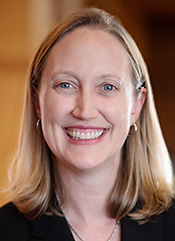The new Center for Law & Philosophy at the University of Virginia School of Law will serve as a focus for one of the strongest groups of legal theorists in the nation.
Professor Deborah Hellman, an expert in the philosophical foundations of discrimination and campaign finance law, will serve as the center’s inaugural director.
Hellman will also be among affiliated faculty, which includes heavyweights such as Professor Frederick Schauer and new faculty member Professor Lawrence Solum.
“I honestly think we have the strongest faculty in the country for law and philosophy,” Hellman said. “We have real stars and a deep bench. Any student or faculty member would be attracted to UVA for that reason.”
With the creation of the center, the Law School now has a robust platform for intellectual exchange, she added.
Hellman joined the faculty in 2012 and is currently the David Lurton Massee, Jr., Professor of Law. Two main strands run through her work. The first focuses on equal protection law and its philosophical justification. She is the author of “When Is Discrimination Wrong?,” published by Harvard University Press, and co-editor of “The Philosophical Foundations of Discrimination Law,” published by Oxford University Press, as well as several articles related to equal protection. The second strand focuses on the relationship between money and legal rights. This includes articles on campaign finance law, bribery and corruption that explore and challenge the normative foundations of current doctrine. Her article “A Theory of Bribery” won the 2019 Fred Berger Memorial Prize (for philosophy of law) from the American Philosophical Association.
But Hellman, with her many accomplishments, was deferential to the other faculty who will comprise the center.
She called Schauer “one of the leading legal philosophers in the world.”
Schauer is a David and Mary Harrison Distinguished Professor of Law at UVA. His expertise has been demonstrated in hundreds of books, book chapters, articles, essays, classes and personal appearances. He was elected a corresponding fellow of the British Academy in July for his outstanding contributions to legal thought. Among his other accolades, he is a fellow of the American Academy of Arts and Sciences, a recipient of a Guggenheim Fellowship, and has been chair of the Section on Constitutional Law of the Association of American Law Schools and of the Committee on Philosophy and Law of the American Philosophical Association.
Solum, likewise, is world-renowned. He joined the faculty this fall from Georgetown University Law Center. He is the author of numerous books and treatises, and has published more than 80 articles in law reviews and philosophy journals. A former editor of the Harvard Law Review, he currently edits and publishes his Legal Theory Blog to highlight and introduce new scholarship by colleagues working in the field, and to serve as a resource for law students and others.
Additional affiliated faculty — the “deep bench” Hellman referred to — include Charles Barzun ’05, Josh Bowers, Naomi Cahn, Anne Coughlin, Vice Dean Leslie Kendrick ’06, Richard Re, George Rutherglen, Richard Schragger, Micah Schwartzman ’05, Gregg Strauss and Steven Walt.

Kendrick, for example, has examined the philosophical foundations of the First Amendment in recent articles in Philosophy & Public Affairs and Law & Philosophy, while Schwartzman has explored religious liberty, public reason, and political liberalism in philosophical journals, law reviews, and recent volumes from Oxford and Cambridge university presses.
The questions that these scholars explore are often ones with significant practical implications. For example, in light of COVID-19, Hellman and a co-author, civil rights attorney Kate M. Nicholson, have recently pondered how life-saving resources should be applied when crises such as pandemics hit. In “Rationing and Disability in a State of Crisis,” they argue that rather than prioritizing resources based only on who might live or who might need to use those resources for less time, hospitals should give people with disabilities additional consideration that ensures equity and respects their humanity, per the Americans With Disabilities Act.
The center will build on a preexisting workshop series, which allows six speakers to present unpublished work in progress. Students may attend these workshops in connection with a seminar in legal theory.
Going forward, the center plans to host additional conferences and speakers who will address the entire law school community, as well as the wider academy and the public.
Founded in 1819, the University of Virginia School of Law is the second-oldest continuously operating law school in the nation. Consistently ranked among the top law schools, Virginia is a world-renowned training ground for distinguished lawyers and public servants, instilling in them a commitment to leadership, integrity and community service.


